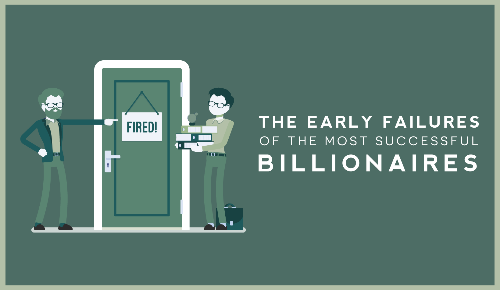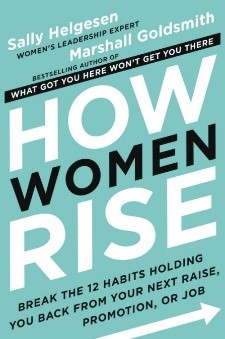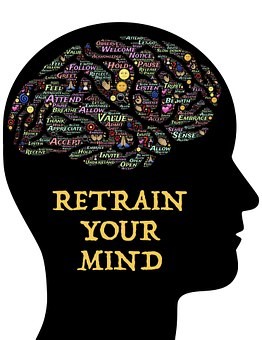This year’s CSE annual meeting and webinars have had 2 topics on careers in publishing. They did not cover the specifics of getting a job in publishing, but rather how to create a successful vocation as an early career professional and how to assert yourself to ensure equal treatment in a diverse environment. At the 2018 CSE Annual Meeting, Alice Meadows and I put forth our career paths and then had a lively discussion with session attendees. For this Infovore column I thought I’d continue the theme of what advice and information early career professionals might find of value.
 Before you try to cast your life’s work in stone immediately after graduation, it’s important to remember that how you start out in your career may certainly not be where you find the greatest satisfaction and success. An infographic by Reuben Yonatan posted on July 24, 2018 reports on the early career “failures” of some pretty well-known people and their take on failure. Here are a few examples:
Before you try to cast your life’s work in stone immediately after graduation, it’s important to remember that how you start out in your career may certainly not be where you find the greatest satisfaction and success. An infographic by Reuben Yonatan posted on July 24, 2018 reports on the early career “failures” of some pretty well-known people and their take on failure. Here are a few examples:
“A path that turns out to be a dead end is very useful because you don’t devote resources on that; you go elsewhere.” —Michael Bloomberg
“Challenges are gifts that force us to search for a new center of gravity. Don’t fight them. Just find a new way to stand.” —Oprah Winfrey
“It is impossible to live without failing at something, unless you live so cautiously that you might as well not have lived at all, in which case you have failed by default.” —JK Rowling
You can see the full infographic at https://getvoip.com/blog/2018/07/24/career-failures/
 Looking for something to really delve into? Geoff Smart, chairman and founder of ghSMART had this to say about a book devoted to circumstances every woman encounters: “Sally and Marshall have written a practical and entertaining career guide tailored to help women ascend to senior leadership roles in business, government, and not-for profits.” I agree! Their 2018 book is How Women Rise: Break the 12 Habits Holding You Back from Your Next Raise, Promotion, or Job. Rather than cite the 12 habits, I want to share with you here the last part of this guide: “Changing for the Better.”
Looking for something to really delve into? Geoff Smart, chairman and founder of ghSMART had this to say about a book devoted to circumstances every woman encounters: “Sally and Marshall have written a practical and entertaining career guide tailored to help women ascend to senior leadership roles in business, government, and not-for profits.” I agree! Their 2018 book is How Women Rise: Break the 12 Habits Holding You Back from Your Next Raise, Promotion, or Job. Rather than cite the 12 habits, I want to share with you here the last part of this guide: “Changing for the Better.”
The 4 basic tenets to follow as you strive for change are:
- Start with One Thing. No matter how many of the habits you may have, take just 1 to focus on so you can develop and sustain a long-term change versus “Let’s do it” enthusiasm.
- Don’t Do It Alone. Colleagues, coaches, and mentors help when you hit those moments of frustration, resentment, failure, or simple burnout so that you don’t crawl back into your old habits.
- Let Go of Judgement. We oftentimes can be our worst advisors as we critique ourselves too harshly and second-guess ourselves too frequently. Because of those bad habits you aren’t facing forward. Instead you’re focusing on the past. And while you’re in the process of being less judgmental of yourself, try not to judge others too harshly as well. As the authors advise: “Judgment of self or of others won’t improve the quality of your life. It certainly won’t make you happier.”
- Remember What Got You Here. You may start working on changing the habits that are holding you back, but don’t shortchange your accomplishments and successes. A healthy respect versus arrogance regarding the skills and talents you bring to the table will balance out your impulse to focus on only your bad habits.
I encourage those of you who are truly serious to read the entire book published by Hachette Books Group. You can check out book’s webpage: https://www.hachettebookgroup.com/?s=How+Women+Rise
 There are a few other bits that might help you begin to construct the foundation of a fulfilling career which have helped me find my best place in the scholarly publishing ecosystem.
There are a few other bits that might help you begin to construct the foundation of a fulfilling career which have helped me find my best place in the scholarly publishing ecosystem.
The first is to be courageous. When an opportunity presents itself—take it! Don’t hesitate at the crossroads mulling over whether to stay on your current path or take that sharp turn to the left. No one ever regretted NOT taking advantage of an opportunity. Even if you wind up in a cul-de-sac, it might be the perfect neighborhood for you. Or a new neighbor may help you move out in a tremendous new direction.
The second is to be honest. My Dad told me when I was little that honesty was better than lying because it took less energy. When you tell a lie, you have to remember the truth, the lie, and who you told the lie to. That’s a lot harder than just being honest with people. But most important you shouldn’t lie to yourself. If you have become bored or frustrated in your position don’t say “I’m sure if I just wait until (fill in the blank) things will be better.” Look at whether there’s another position where you can flourish. If not, dust off that resume and start looking elsewhere.

The third is to be aware. This concept covers a large territory: Recognize the good and bad attributes of your environment, your peers, your co-workers (up and down the hierarchy), an
d how what you do just doesn’t reflect back on you, but how your actions affect those around you. (Suggestion: Remember to take this concept home with you each night.)
There’s no one place to get advice about breaking into publishing… there are many! Primarily because there are so many different opportunities. Here are some articles you can easily access and glean a few good tidbits from each.
https://phoebemorganauthor.com/2018/03/25/getting-a-job-in-publishing/ (There are 9 pieces of good advice in this article which was written by a book publishing professional but are applicable to nearly any area of publishing.)
https://www.chroniclebooks.com/blog/2016/01/05/so-you-want-to-work-in-publishing-advice-from-a-chronicle-books-editor/ (If you are interested in book acquisitions this is a short but good article to read.)
https://www.findspark.com/how-to-break-into-the-publishing-industry-psst-it-is-not-just-for-english-majors/ (This article moves beyond book publishing even if not STM and scholarly publishing and has some good tips.)
I couldn’t end an Infovore column for early career professionals in scholarly publishing without including links to some of the professional organizations in our industry. Membership and participation in these groups allows you to meet some of the most senior and some of the most respected individuals in our industry. Do visit their websites and be sure to get their e-alerts for new positions and other job postings. They are also an excellent way to stay current on news, major events, and trends.
Council of Science Editors:
International Society of Managing and Technical Editors:
Society for Scholarly Publishing:
Society for Technical Communications:
And as I’ve said in conversations, lectures, and presentations, I’m open to helping serious early career professionals with advice and moral support. Connect with me on LinkedIn at www.linkedin.com/in/barbarameyersford
*A person who indulges in and desires information gathering and interpretation. The term was introduced in 2006 by neuroscientists Irving Biederman and Edward Vessel.
